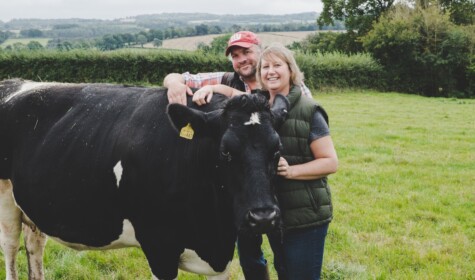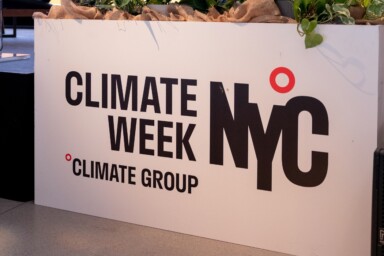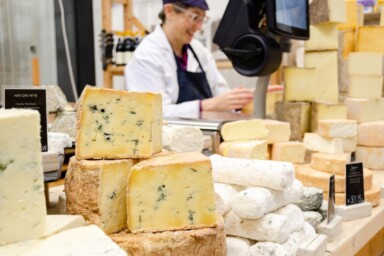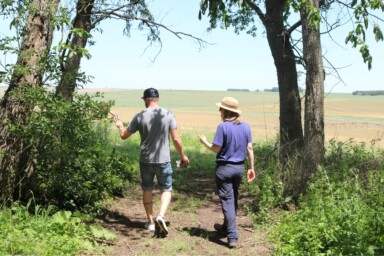How can measuring sustainability help us to understand and value the produce and services that farmers deliver? In this series, we explore the role of metrics in transitioning to a more sustainable food and farming system, and we meet some of the people who are leading the way. Here, Alicia Miller, Content Editor for the Sustainable Food Trust, looks at why farmers, workers and communities are the bedrock of a resilient food and farming system.
Social capital refers to the shared values or resources that enable us to work together towards a common goal. Within farming, building social capital is essential in the development of the networks and connections that bind people together and support the wellbeing of farmers and workers. At its heart, is the generation of community, which can be realised in a wide variety of ways: from a neighbour who helps you with a task or a friend who introduces you to a valuable contact, to more expansive interactions in which diverse individuals band together to create meaningful social change through activism, such as Greta Thunberg’s ‘Fridays for Future’ movement or grassroots campaigns promoting improved farm safety.
For farmers, social capital can have varied value and it is frequently overlooked in what is, for many, a lonely profession. It’s important for farmers to have engagement with peers and their wider community but long hours and the demands of farm work can make this hard. Connection with others is important from a purely social perspective but it is also crucial for sharing knowledge and best practice. Learning from one another can be the difference between failure and success.
The SFT’s Global Farm Metric emphasises the value of a thriving local community as being ‘vital for farmers, their families and their workers’. While these networks remain strong in many ways, there are also vulnerabilities due to the erosion of local services and infrastructure within rural communities. An example can be found in the decline of local abattoirs, which are disappearing at an alarming rate as smaller, locally owned businesses are pushed out by larger, centralised facilities. The decline of these key services erodes local networks, reduces employment opportunities and skills, and can damage the productive capacity of farms.
However, despite these challenges, many small and medium-scale farms are finding value in diversification, embracing new opportunities and ways of thinking. Evaluating the impact of social capital in agriculture requires a multi-faceted perspective. There are increasingly diverse ways of working and interfacing with other producers to strengthen networks but also to work holistically to support one another. In the US, for example, organic milk producer Albert Straus works with a group of small family farms in Marin and Sonoma Counties. He sees it as a way of revitalising rural communities and giving space for new enterprises to develop. Straus feels that “collaborating with the next generation is essential.”
There are many other farmers who have grounded their business in the value of people and community. Stream Farm in the Quantocks, Southwest England, is built on a share-farming model that is also a means of training. Workers typically come to them for a couple of years and take on one of the farm’s businesses; these workers are self-employed and receive a share of the gross profit. It is a chance for new entrant farmers to learn and develop, without the immediate need for capital or skills. Stream Farm has now supported over 25 share farmers, most of whom have stayed for two years before moving on to continue farming enterprises elsewhere or pursue further self-employment opportunities.
Farms are also diversifying in unexpected ways, becoming more public and outward facing. The SFT’s CEO, Patrick Holden, and his wife, Rebecca Holden, are using their farm, Bwlchwernen Fawr, as a centre for educational encounters and a place to facilitate dialogue and exchange around issues in the local community. Recently, they hosted an event in collaboration with NFU Cymru and The Harmony Project that brought together people from across the Welsh food and farming system to explore how schools can introduce more local, seasonal produce onto their menus and integrate food education into the curriculum. Such events can strengthen social ties between people working in different but related sectors, creating meaningful change that can help to overcome stasis in complex or difficult issues.
The Sustainable Food Trust has also been exploring the potential of social prescribing in a recent pilot project with several GP practices in and around Bristol. Social prescribing involves linking individuals to social or community-based activities or resources which have the potential to improve health and wellbeing. During the pilot, a six-week programme of farm-based activities was offered to participants, including spending time with farm animals, farm walks, foraging and harvesting, healthy cooking demonstrations, collecting honey and getting occupational experience.
Langford Farm, run by Teresa and Charlie Allward, was one of the farms involved in the pilot. The farm is an organic fifth-generation beef and dairy farm in north Somerset, which is mainly made up of permanent pasture and hay meadows, both rich in native grasses, wildflowers and wildlife. Here, we caught up with Teresa and Charlie to talk about why people and community underpin their approach to farming.
SFT: Can you tell us a bit about what you’re doing on your farm to deliver positive impacts for the community?
Teresa & Charlie: We have been a long-established dairy and beef farm for many generations, so our farm, land and family are deeply rooted in the local area, especially as we are situated close to a village and to people, homes and lives.
We have practised organic farming methods and principles for many years and have been certified for over 25 years, always farming with a more extensive and sustainable approach, which we believe has positive impacts on the wider community, not just those who live close to the farm.










